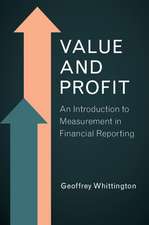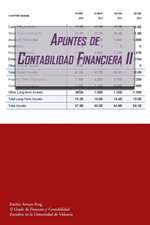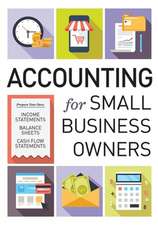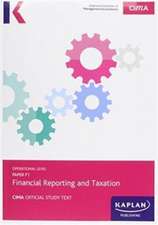Manage Your Money and Investments with Microsoft Excel
Autor Peter Aitkenen Limba Engleză Mixed media product – 21 iun 2005
Sure you want to save money. We all do. But saving money is sometimes easier said than done. Did you know that there is a program probably already installed on your computer that can help you manage your money better? It's Microsoft Excel, part of the Microsoft Office suite. Manage Your Money and Investments with Excel can help you take control of your finances with Excel. Learn how to:
- Perform basic financial calculations.
- Track and analyze investments.
- Compare mutual fund options.
- Manage mortgages, loans, and escrow accounts.
- Balance checking accounts and manage credit card debt.
- Track your net worth.
Discover new ways to make money-saving decisions and manage your finances with Manage Your Money and Investments with Excel.
Preț: 161.85 lei
Nou
30.97€ • 32.48$ • 25.78£
Carte în stoc
Livrare din stoc 20 februarie
Specificații
ISBN-10: 0789734281
Pagini: 276
Dimensiuni: 178 x 235 x 17 mm
Greutate: 0.43 kg
Ediția:1
Editura: Pearson Education
Colecția QUE
Locul publicării:Indianapolis, United States
Cuprins
Introduction.
Why Excel?
Who This Book Is For
More Information and Updates
I. UNDERSTANDING THE BASICS OF FINANCIAL CALCULATIONS.
1. Taking Control of Your Finances.
Facing the Problem
Setting Goals
What Excel Can Do for You
Why Excel and Not Quicken or Money?
Excel Versions
Using the Worksheet Templates
Template Conventions
About Percentages
2. Using Excel to Work with Money.
Excel Basics
Getting Around
Selecting Cells
Entering and Editing Data
Formatting the Worksheet
Formulas in Excel
Excel Functions
Excel and Money
Cash Flow
Formatting Money and Percentage Values
Charting Your Course
3. Working with Basic Financial Calculations.
Calculating Loan Payments
Calculating Principal Payments
Working with Future Value
Using the Present Value Function
Calculating Interest Rate
4. Tracking Your Net Worth.
What Is Net Worth?
Assets to Include
Liabilities to Include
The Net Worth Calculator
Interpreting Your Net Worth
Keeping Track over Time
II. TAKING CONTROL OF YOUR BANK AND CREDIT CARD ACCOUNTS.
5. Managing Your Money with a Budget.
What Is a Budget?
Budget Fundamentals
The Home Budget Calculator
The Overview
Transactions
Paychecks
Entering Transactions
Getting Started with Your Budget
Living with a Budget
Analyze Your Spending
Live Within Your Means
Balancing Your Budget
Watch Impulse Buying
Look for Sales
Learn to Cook
6. Being Smart with Your Checking Accounts.
How Checking Accounts Work
Types of Checking Accounts
Other Checking Account Fees
Understanding Debit Cards
Be Smart with ATM Cards
Cheap Checks
Other Account Services
How to Get a Free Checking Account
The Checkbook Register Application
How the Checkbook Register Workbook Works
Getting Started with the Register
Entering Transactions
Sorting Transactions
Editing Transactions
Keeping Headings in View
Reconciling Your Register
7. Getting the Most From Your Credit Cards.
How Credit Cards Work
Credit Card Interest Rates
Credit Card Fees
Credit Card Advantages
What About Debit Cards?
Hooray for the Grace Period
Reward Cards
Using Your Credit Cards Wisely
Never Charge Anything You Cannot Pay Off
Use the Grace Period
Get a Rewards Card
Be Careful to Make Payments on Time
Mind Your Credit Limit
How Much Will It Really Cost?
The Real Cost Calculator
Why Carrying a Balance Is to Be Avoided
Paying Off Your Balance
The Payoff Calculator
Using a Credit Card for Cash Advances
Understanding Cash Advances
The Cash Advance Cost Calculator
III. FINANCING YOUR HOME AND CAR.
8. Understanding Mortgages-And Getting the One That's Best for You.
The Many Benefits of Home Ownership
Types of Mortgages
Traditional Fixed Rate Mortgages
Adjustable Rate Mortgages
Balloon Mortgages
Hybrid Mortgages
Your Mortgage Payment
Other Mortgage Costs
Origination Fee
Points
Private Mortgage Insurance
The Tax Benefits of Home Ownership
Understanding Mortgage Amortization
How Much Can I Borrow?
The Maximum Mortgage Calculator
The Mortgage Detail Calculator
9. Considering Home Equity Loans.
What Is a Home Equity Loan?
How They Work
How Much Can I Borrow?
Home Equity Loan Cautions
Home Equity Calculations
10. Refinancing Your Mortgage.
Why Refinance?
Costs of Refinancing
Making a Decision
The Mortgage Refinance Breakeven Calculator
How to Use the Calculator
11. Understanding Escrow Accounts.
Escrow Is for Taxes and Insurance
Canceling Your Escrow Account
The Escrow Cancellation Calculator
12. Renting Versus Buying Your Home-Making the Right Choice.
Why Buy a Home?
Financial Factors of Home Ownership
The Down Payment
Closing Costs
Ownership Costs
The Rent Versus Buy Calculator
13. Your New Car- Lease or Buy?
Do You Really Need a New Car?
Understanding Auto Leases
Advantages and Disadvantages of Leasing
Types of Leases
Lease Conditions
Lease Payment Calculator
The Lease or Buy Calculator
IV. MANAGING YOUR INVESTMENTS.
14. Learning the Fundamentals of Investing.
Investment Vehicles
Stocks
Bonds
Mutual Funds
Exchange Traded Funds
Treasury Bills
Savings Accounts
Certificates of Deposit
Money Market Accounts
Risk Versus Return
Your Investment Timeframe
Choosing a Brokerage Account
Dividend Reinvestment Plans
15. Tracking Your Investments.
Why Track Investments?
The Investment Portfolio Workbook
The Holdings Worksheet
The Query Worksheet
Using the Investment Portfolio Template
16. Comparing Mutual Funds.
Choosing Mutual Funds
The Mutual Fund Comparator
17. Planning for College or Retirement.
Long-term Planning
Accounting for Inflation
The Inflation Effects Calculator
Predicting Your Needs
Not Over-Saving
Saving for College
The College Cost Calculator
The College Savings Calculator
Saving for Retirement
What About Social Security?
How Much Retirement Income Will You Need?
How Much Do You Need to Save?
Annuities
The Retirement Planner Workbook
APPENDICES.
A. Workbook Reference.
Chapter 4: Net Worth Calculator
Chapter 5: Budget Workbook
The Budget Menu
The Transactions Worksheet
The Transaction Entry Form
Entering Paychecks
The Overview Worksheet
Chapter 6: Checkbook Register Workbook
The Register Menu
Entering Transactions
Sorting the Transactions
Calculating the Totals
Chapter 7: Real Cost Calculator
Chapter 7: Payoff Calculator
Chapter 7: Cash Advance Cost Calculator
Chapter 8: Mortgage Payment Calculator
Chapter 8: Mortgage Points Comparator
Chapter 8: Mortgage Tax Savings Calculator
Chapter 8: Maximum Mortgage Calculator
Chapter 8: Mortgage Detail Calculator
Chapter 9: Home Equity Line of Credit Calculator
Chapter 10: Mortgage Refinance Breakeven Calculator
Chapter 11: Escrow Cancellation Calculator
Chapter 12: Rent Versus Buy Calculator
The Input Worksheet
The Output Worksheet
The Chart Worksheet
Chapter 13: Lease Payment Calculator
Chapter 13: Lease or Buy Calculator
Chapter 15: Investment Portfolio Workbook
Chapter 16: Mutual Fund Comparator
Chapter 17: Inflation Effects Calculator
Chapter 17: College Cost Calculator
Chapter 17: College Savings Calculator
Chapter 17: Retirement Planner Workbook
B. Glossary of Financial Terms.
Index.
Notă biografică
Peter Aitken has been writing about computers and software for more than 15 years. He has over 40 titles to his credit as well as innumerable magazine and web articles. Peter is an expert Excel developer and has done financial consulting and programming for clients in the real estate industry, including a stint as a Vice President of The Chubb Group of Insurance Companies. Recently Peter wrote Excel Programming Weekend Crash Course (Wiley; 0764540629) and co-wrote Excel Formulas and Functions for Dummies (Wiley, 0764575562).
Textul de pe ultima copertă
Sure you want to save money. We all do. But saving money is sometimes easier said than done. Did you know that there is a program probably already installed on your computer that can help you manage your money better? It's Microsoft Excel, part of the Microsoft Office suite. Manage Your Money and Investments with Excel can help you take control of your finances with Excel. Learn how to:
- Perform basic financial calculations.
- Track and analyze investments.
- Compare mutual fund options.
- Manage mortgages, loans, and escrow accounts.
- Balance checking accounts and manage credit card debt.
- Track your net worth.
Discover new ways to make money-saving decisions and manage your finances with Manage Your Money and Investments with Excel.
























